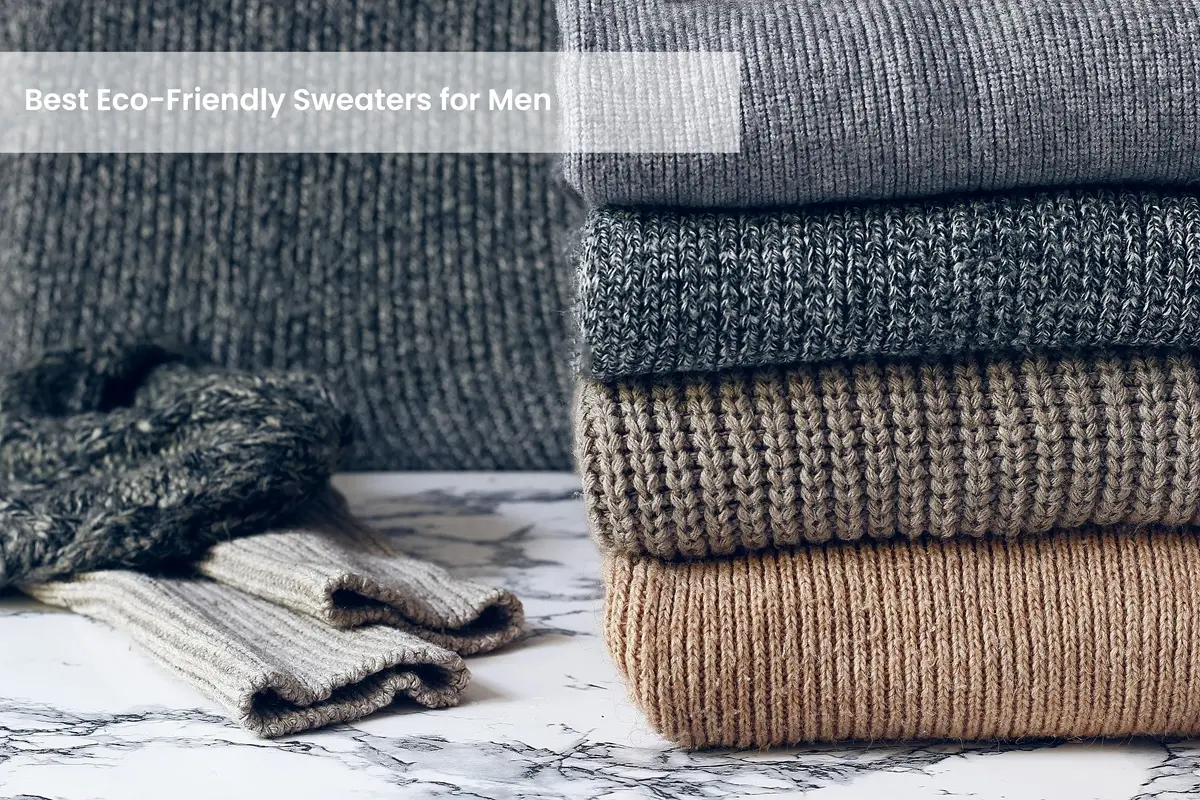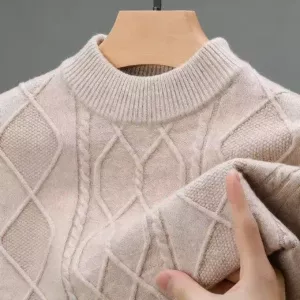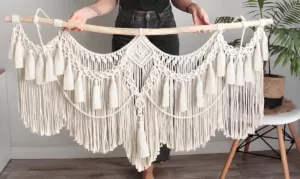Table of Contents
Sustainability is more than a buzzword — it is rapidly becoming the bedrock of the contemporary fashion world. With environmental talk gaining weight, an increasing number of consumers are choosing brands aligned with sustainability practices. For many, the easiest and most effective way to reduce their environmental impact is to switch to sustainable clothing. If there is one of the utilitarian clothing that embodies both sustainability and style, it has to be sweaters!
Eco-friendly sweaters not just look good and are comfortable to wear, they work to reduce the detrimental and harmful impact of clothing manufacturing on the environment. The raw materials are less hard on our planet, yet making sure your wardrobe is part of a greener future with organic cotton, recycled polyester and much more… This guide delves into the best eco-friendly sweater brands out there for men, with a focus on sustainability on the manufacturing front as well as the materials used in their products.
Why Choose Eco-Friendly Sweaters?
The fashion industry is among the most polluting industries in the world, with roughly 10% of global carbon emissions each year, and massive water waste and textile pollution. The Ellen MacArthur Foundation estimates that 10% of global carbon emissions and 20% of the global wastewater is produced by the fashion industry. But in recent years, the demand for environmentally friendly clothes has skyrocketed, leading the brands to identify substitutes for traditional materials and processes that are detrimental to the environment. Eco-friendly sweaters, crafted from sustainable materials like organic cotton, recycled polyester, and ethically sourced wool, present a greener alternative to fast fashion that minimizes whether we choose to participate in or experience its ugly effects.
It’s not only about looking good (true), it’s also about doing good (also true). By choosing sweaters made of sustainable (or recycled) materials, you will be helping:
- Less carbon emissions: Eco-friendly fibers like organic cotton and recycled materials have significantly lesser carbon emissions than conventionally produced alternatives.
- Water conservation: Conventional cotton farming uses a lot of water, whereas organic cotton and production with recycled materials use far less.
- Minimizing waste: Many sustainable brands make use of post-consumer materials — plastic bottles or used fabric, for example — to produce new clothes, minimizing what goes to dumping grounds.
By making conscious choices when it comes to your wardrobe, you not only support a more sustainable fashion industry but also reduce your personal environmental impact.
Best Eco-Friendly Sweater Brands for Men
The boom in eco-friendly fashion has birthed dozens of brands that make ethical, high-quality sweaters. From organic cotton to recycled polyester, these brands offer chic alternatives to fast fashion. ParkerUse: Best Eco-Friendly Sweater Brands For Men PanelUse: Best Eco-Friendly Sweater Brands For Men Best Eco-Friendly Sweater Brands For Men
David Boysen on Patagonia: The Sustainable Fashion Originator
Patagonia has long been a leader in sustainable fashion. The brand fully focuses on minimizing its environmental impact and has been known for its use of recycled materials, fair trade practices, as well as its environmental activism. Their sustainable sweaters are no exception.
Why It’s Eco-Friendly:
- Recycled Wool and Polyester: Many of Patagonia’s sweaters are made from recycled wool and recycled polyester, which reduces the demand for virgin fibers and prevents waste from entering landfills.
- Fair Trade Certified Patagonia products: Patagonia Fair Trade Certified products guarantee fair wages and safe working conditions for the workers in its supply chain.
- Environmental Activism: Patagonia gives away 1 percent of its profits to environmental causes, backs grassroots activism and maintains its climate action pressure.
Best For: People who want a durable, eco-friendly sweater from a brand that’s proven its environmental advocacy credentials.
Allbirds: Stylish, Sustainable Merino Wool Sweaters
The brand: Known for its eco-friendly shoes, Allbirds also has a line of sustainable pullovers. Well known for using natural, renewable materials, like merino wool, in their designs.
Why It’s Eco-Friendly:
- Merino Wool — Allbirds uses merino wool sourced from non-mulesed sheep in a sustainable manner. It is naturally biodegradable, renewable, and provides excellent insulation, making it great for sweaters.
- Carbon-Neutral Shipping: Allbirds offsets the carbon footprint of their shipping, to bring you products with minimal carbon footprint.
- Simplicity in appearance: Allbirds prides itself on simple designs that can be used in multiple ways, helping to promote a versatile, long-lasting wardrobe.
Ideal for: Men seeking stylish, all-sustainable sweaters that may spare the world from a little warmth (and if you don’t put these on the floor, they’re not really going to leave much of a mark on the world either).
Outerknown: Your Go-To Sustainable Surf-Inspired Brand
Outerknown, founded by the pro surfer Kelly Slater, is a label that combines sustainability with a relaxed, beachy vibe. The label specializes in beautiful sweaters made from organic cotton, hemp, and recycled materials that leave a small environmental footprint.
Why It’s Eco-Friendly:
- Organic Cotton and Hemp: Outerknown incorporates organic cotton and hemp into many of its sweaters, two more sustainable alternatives to traditional cotton.
- Transparency: The brand prides itself on transparency, offering customers insight into its supply chain, so they can be informed about where their garments are coming from and how they are made.
- Fair Labor Practices: Outerknown only partners with factories in the above locations that maintain fair labor practices and guarantee fair pay.
Most Suitable For: Anyone wanting a casual, surfer-themed sustainable brand with ethical production methods.
The post Toad&Co: Comfortable, Versatile, and Sustainable appeared first on Jennifer Ellis.
Toad&Co has a great reputation for producing eco-conscious clothing for outdoor activities. For its sweater collections, the brand emphasizes the use of eco-friendly materials like recycled polyester, organic cotton, and hemp.
Why It’s Eco-Friendly:
- Recycled & Organic Materials: To make its sweaters, Toad&Co uses recycled polyester, organic cotton, and hemp, eliminating waste and the need for virgin materials.
- Environmentally Conscious Production: The brand employs the use of eco-friendly dyes as well as water-saving techniques in its production methods.
- Social Responsibility: Toad&Co is an environmentally responsible brand, donating a percentage of profits directly to environmental causes.
Best For: Those in search of flexible, strong, sustainable sweaters for outdoor activities or wearing around the house.
Everlane — Transparency with a Side of Sustainability
Everlane’s Transparency: Everlane is known for its radical transparency. Its sweaters — made from sustainable materials such as organic cotton and recycled wool — promote fair labor practices and environmental responsibility.
Why It’s Eco-Friendly:
- Organic Cotton and Recycled Wool: Everlane’s sweaters are made with organic cotton and recycled wool, both of which are each less harmful to the environment than the traditional materials.
- Transparent Supply Chain: Customers learning the truth about and knowing what / who they support with their purchasing choices. Everlane gives consumers a full breakdown of where their garments are made and the environment in which they are made.
- Sustainable Packaging: The brand packs orders in minimal, compostable, and/or recyclable materials to eliminate waste.
Best For: Minimalists seeking high-quality sweaters that are sustainable and ethically-made.
Learning About Eco-Friendly Materials Used in Sweaters
When searching for sustainable fashion, selecting the right materials is vital. Eco sweaters are not just less harmful to the planet, they’re often much more comfortable and durable, too. Here’s a closer look at a few key eco-conscious materials often used in men’s sweaters.
Organic Cotton
Unlike regular cotton, organic cotton is grown without synthetic pesticides or fertilizers, making it better for the planet — and for farmers. It also requires less water than traditional cotton, so organic cotton is a more environmentally-friendly option. Breathable, soft, and comfy, organic cotton sweaters are great for all year ‘round wear.
Recycled Polyester
Recycled polyester is produced from plastic waste post-consumer plastic waste — think used plastic bottles — or discarded apparel. This material helps to reduce waste and energy used in creating virgin polyester, making it a greener alternative. Recycled polyester is durable, moisture-wicking, and lightweight, meaning it makes a functional but fashionable sweater.
Responsibly Sourced Wool
Wool is a sustainable fiber source that is both biodegradable and renewable, making it a great choice when looking for a sustainable sweater. But wool can be sourced in several different conditions that can influence its environmental and ethical footprint. When it comes to wool, only buy responsibly sourced ones. This wool is softer, more durable and done in a more sustainable way than conventionally sourced wool.
Hemp and Bamboo
Hemp and bamboo require minimal water, pesticides, and synthetic fertilizers to cultivate. Both are biodegradable and have a lower environmental impact than cotton. Hemp is especially resistant to pest and extremely durable; bamboo is soft, breathable, and antimicrobial, making it a common choice for sustainable garments.
So Why Choose Eco-Friendly SweatersOver Regular Ones?
The best part is by wearing sustainable sweaters you are contributing to less waste making the fashion industry truly sustainable. The environmental benefits include:
Reducing Carbon Footprint
Whether they are made from recycled, biodegradable fabrics, or produced in more sustainable ways, eco-friendly sweaters carry a tiny environmental footprint compared to typical textile production. By choosing materials like organic cotton, recycled polyester and responsibly sourced wool, you are helping to decrease the total greenhouse gas emissions created by producing garments.
Water Conservation
Conventional cotton farming uses an extraordinary amount of water, but organic cotton and fiber made from recycled materials need far less. By wearing eco sweaters, you are conserving one of the planet’s most precious resources.
Waste Reduction
Many sustainable sweater brands use recycled fibers in their products to help cut down on plastic and textile waste in landfills. You are decreasing the amount of waste that we have piling up in our oceans and landfills by opting to purchase recycled products.
Supporting Ethical Practices
All the eco-friendly sweater brands featured not only protect the planet but also ensure fair wages and treatment for all workers making them. Opting for sustainable brands also ensures a more sustainable workforce in the fashion world.
Why Sustainable Sweaters Are the Future of Fashion
Eco-friendly sweaters are not only a trend — each piece is a part of a bigger movement to more sustainable and ethical fashion. You are taking a step towards a more sustainable planet and supporting ethical production by opting for sweaters crafted with organic, recycled, or responsibly sourced materials.
If not it will be but as sustainable fashion increases the options available to eco-friendly consumers increase. Whether you’re drawn to the classic charm of merino wool, the strength of recycled polyester or the softness of organic cotton, there will be an eco-friendly sweater matching your style and values.
So when your next wardrobe update is in order, make it a sweater from one of the brands in this guide — trust us. You’ll not only be investing in quality and comfort, you’ll also be supporting a fashion industry that’s better for the planet and its people.
FAQs
What makes a sweater eco-friendly?
An eco-friendly sweater is made from sustainable materials and produced using environmentally responsible practices. These materials can include organic cotton, recycled polyester, merino wool from ethical sources, and even plant-based fibers like hemp and bamboo. Eco-friendly sweaters also focus on reducing carbon emissions, conserving water, and minimizing waste in their manufacturing processes.
Are eco-friendly sweaters as durable as regular sweaters?
Yes, eco-friendly sweaters can be just as durable, if not more so, than traditional sweaters. Brands that prioritize sustainability often choose high-quality materials like responsibly sourced wool or organic cotton, which are known for their long-lasting properties. Additionally, many eco-friendly options incorporate recycled fibers, such as recycled polyester, which are designed for durability and longevity.
How do I know if a brand is truly eco-friendly?
To determine if a brand is genuinely eco-friendly, look for certifications and transparency. Brands that are truly committed to sustainability often display certifications like Fair Trade, Global Organic Textile Standard (GOTS), or OEKO-TEX. They may also provide information about their sourcing practices, the materials used, and how their products are made. Brands that invest in these certifications show a commitment to ethical and sustainable practices.
Are eco-friendly sweaters more expensive than regular sweaters?
Eco-friendly sweaters can sometimes be more expensive than traditional options, but the price reflects the quality and sustainability of the materials used, as well as ethical labor practices. While the initial cost may be higher, investing in high-quality, durable pieces means you’ll likely save money in the long run by purchasing fewer replacements. Additionally, supporting sustainable brands contributes to a better, more ethical fashion industry.
How can I care for my eco-friendly sweater to extend its life?
To get the most out of your eco-friendly sweater, follow care instructions closely. Many sustainable fabrics require gentle washing to maintain their integrity. For example, washing in cold water and air-drying your sweater can prevent shrinkage and reduce energy consumption. Avoiding harsh chemicals or excessive washing will also help preserve the fibers and keep your sweater looking great for years to come.









